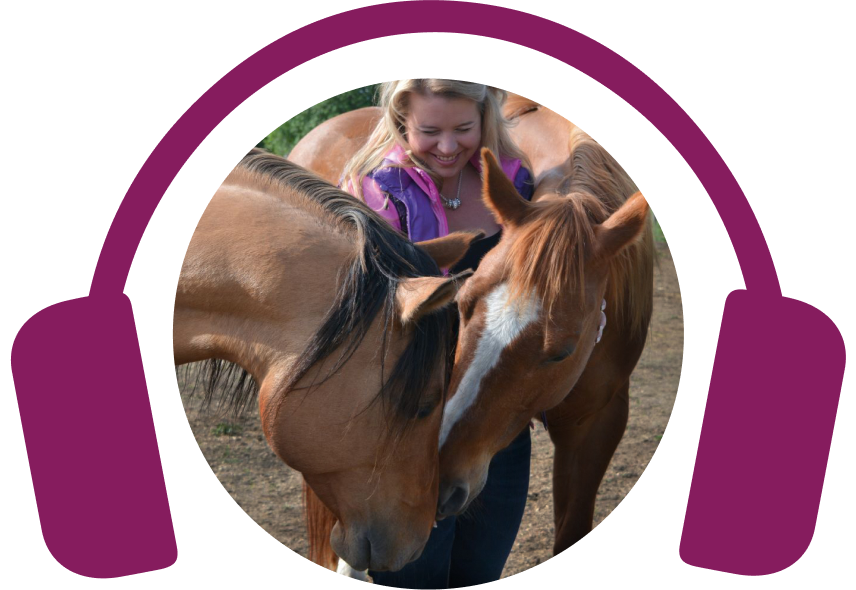Elisha’s Podcast
ELISHA’S PODCAST

Ready to get your horses on the path to better health?
This podcast was created to do just that.
Tune in to get new insights, perspectives, horse health tips, and real-life horse healing stories.
Take what you learn and apply it to your horse TODAY.

One Conversation at a time
From learning what to feed your horse and how to use nutrition effectively, to practicing prevention and approaching specific health challenges naturally, to just bringing your horse more joy and better health…
I’ve got you covered!

Check out my recent episodes
Even though homeopathy is the second-largest medicine system in the world, many people have never even heard of it.So, this week, I am focusing on using homeopathy to finish a case. My inspiration for this topic came from an insightful documentary I recently watched called Introducing Homeopathy, covering the history and scientific foundations of homeopathy. It is a must-watch for anyone curious about this powerful yet often overlooked system of medicine. Join me as we explore the wonders of homeopathy, revealing its effectiveness for managing toxicity in horses and addressing their chronic health issues. Introducing Homeopathy provides a comprehensive examination of the history of homeopathy and its remarkable efficacy in addressing a diverse range of health conditions. Through in-depth discussions and insights from experts worldwide, including esteemed scientists and Nobel laureates, the documentary sheds light on the scientific foundation of homeopathy. It emphasizes the unique philosophy underlying the homeopathic approach to healing, showcasing numerous success stories highlighting its effectiveness in improving health and well-being. We have recently covered cases highlighting the use of homeopathy for various aspects of equine health while also focusing on the importance of nutrition, stress management, and toxin removal for laying the groundwork for homeopathic remedies to achieve optimal results. That strategic approach recognizes the value of homeopathy as an energy-based medicine that relies on a clear and precise understanding of symptoms for accurately selecting the best remedy and maximizing its therapeutic potential. In Introducing Homeopathy, the efficacy of homeopathy is illustrated vividly through various case studies that showcase its ability to complement and enhance efforts to strengthen immunity and detoxify the body. With conditions like chronic sinusitis or parasite infections, homeopathy significantly improves the outcomes. That highlights the importance of addressing fundamental health factors before integrating homeopathy into a treatment plan. While homeopathy offers substantial benefits, challenges may arise, particularly in cases like laminitis with mechanical foot issues. In those situations, holistic interventions alongside homeopathy are essential for comprehensive care. It is crucial to approach homeopathy judiciously, particularly regarding complex and chronic health conditions, while also recognizing its potential to provide relief in acute scenarios like colic. In conclusion, I encourage you, the listener, to delve deeper into the principles and applications of homeopathy by watching the documentary Introducing Homeopathy. By gaining a more comprehensive understanding of the role of homeopathy within a holistic treatment framework, you can optimize your health outcomes and achieve lasting wellness. Through continuous exploration and education, you will learn about the benefits of homeopathy for us individuals and the broader healthcare community. Connect with Elisha Edwards on her website Join my email list to be notified about new podcast releases and upcoming webinars. Free Webinar Masterclass: Four Steps to Solving Equine Metabolic Syndrome Naturally Register for Resolving Equine Metabolic Syndrome Naturally, now Virtual Screening of the Documentary,Introducing Homeopathy Over the past few weeks, I have covered equine metabolic syndrome, insulin resistance, and thyroid function. One of the minerals essential for many of those physical processes is selenium. So, today, I take a closer look at selenium, providing an in-depth analysis of this essential nutrient. By understanding the role of selenium, recognizing signs of deficiency, and knowing when to supplement it, we can make more informed decisions for the health of our horses. Join us to learn all you need to know about selenium and the diet and lifestyle risk factors that could result in a selenium deficiency. Selenium is an antioxidant crucial for holistic equine health. Antioxidants like selenium scavenge free radicals, aiding detoxification and supporting the immune system. They are particularly beneficial for horses facing toxicity or immune challenges. While I do not recommend ongoing daily supplementation for all nutrients, selenium is an exception due to common deficiencies, especially for horses prone to equine metabolic syndrome and insulin resistance. It is best to start with intensive supplementation before transitioning to a maintenance regimen, typically three to four times weekly, to ensure optimal long-term selenium levels. Selenium serves a range of functions beyond supporting the immune system, supporting healthy skin, hair, hooves, muscle function, and thyroid health. It is also crucial for metabolic balance and is particularly essential for working horses due to their higher demand. Many horses show deficiency symptoms due to inadequate selenium levels in their diet and environment. Signs of selenium deficiency include weakened hooves, skin issues, hair loss, fatigue, liver toxicity, poor immunity, muscle issues, and thyroid dysfunction. While selenium toxicity has historically been a concern, deficiencies are far more common. Organic selenium forms like selenomethionine are safe and highly bioavailable, mitigating toxicity risks associated with inorganic forms like sodium selenite. For horses deficient in selenium, a loading dose of 2000 micrograms per day for a few weeks, followed by a maintenance dose of 1000 micrograms, works well. Dosages must be tailored to the requirements of each horse and monitored for optimal results. Given how common selenium deficiencies are and the critical importance of selenium for equine health, maintaining a regular supplementation routine that gets adjusted to suit the individual needs of each horse is prudent for their overall well-being. Understanding the significance of selenium, recognizing signs of deficiency, choosing the appropriate form for supplementation, and implementing a tailored regimen are essential steps in optimizing equine health and performance. Regular monitoring and adjustments will ensure sustained benefits and support for equine health and vitality. Connect with Elisha Edwards on her website Join my email list to be notified about new podcast releases and upcoming webinars. Free Webinar Masterclass: Four Steps to Solving Equine Metabolic Syndrome Naturally Register for Resolving Equine Metabolic Syndrome Naturally now Today, we are diving into a case study of a horse called Monty. His journey is an inspiring story of dedication and progress. His owner, Lisa, and I started addressing his issues in November 2023, and since then, Monty has transformed remarkably. This case reflects many of the concepts we have discussed recently. So, listeners who face similar challenges with their horses will easily relate to it. Monty's Background Monty is a 16-year-old Rocky Mountain gelding. He lives with his owner, Lisa, in Minnesota. Lisa has over a decade of experience with horses, having owned them for ten years. She and Monty have extensively engaged in trail riding, exploring areas like Wyoming, North and South Dakota, and Kentucky, also participating in competitive trail challenges. The beginning of Monty's Health Journey In March 2021, Monty developed laminitis symptoms, indicating a potential health issue. A blood test in May 2021 revealed high insulin levels (500), slightly elevated glucose (127), and a borderline low thyroid hormone level (1.3). Initial Treatment and Concerns Monty received medication to manage his insulin and thyroid levels. However, despite improved numbers, his overall health deteriorated over time. He became lethargic, had a dull coat, and showed signs of muscle wasting. Addressing Anaemia and Nutrition After identifying anemia and low thyroid function as critical issues affecting his well-being, Lisa and I tailored a nutrition plan, including B12, folic acid, iron, selenium, and gut-supportive supplements, and implemented it to address his problems. Adjusting Medication and Nutrition Over time, we shifted our focus toward a clean and balanced diet, focusing on nutrient-rich foods and supplements. We reduced his medication and adjusted his nutrition to help him gain weight, increase his energy levels, and improve his overall health. Exercise and Quality of Life We also incorporated exercise into his routine, tailored to his energy levels, to improve his circulation, insulin sensitivity, and overall well-being. Lisa began to notice positive changes in his energy and social behavior, indicating his quality of life had improved. Progress and Monitoring With regular check-ins and bloodwork monitoring, Monty showed significant improvements in his insulin, glucose, and thyroid levels, indicating we had successfully managed his health issues without relying on medications. Adjusting his nutrition and lifestyle also contributed to his overall recovery and well-being. Key Takeaways Monty's case study highlights the importance of a holistic approach to equine health, focusing on tailored nutrition, exercise, and lifestyle adjustments. It disproves the common belief that horses with metabolic issues cannot recover without medication and highlights the effectiveness of proper nutrition and care for achieving optimal health outcomes. Links and resources: Connect with Elisha Edwards on her website Join my email list to be notified about new podcast releases and upcoming webinars. Free Webinar Masterclass: Four Steps to Solving Equine Metabolic Syndrome Naturally Register for Resolving Equine Metabolic Syndrome Naturally nowDocumentary Insights
Optimal Timing for Homeopathy Applications
Illustrative Case Studies and Considerations
Navigating Complexities and Overcoming Challenges
Encouraging Continued Exploration and Understanding
Links and resources:
An Overview of Selenium
Supplementation Duration and Importance
The Roles and Benefits of Selenium
Deficiency Signs and Risks
Balancing Deficiency and Toxicity Concerns
Supplementation Guidelines
Long-term Considerations
Conclusion
Links and resources:
Meet your host
Hi there, I’m Elisha Edwards

Meet your host
Hi there, I’m Elisha Edwards
I have helped guide thousands of horses back to good health over the years from a variety of different health challenges. And through my courses, webinars, and speaking engagements I educate and empower horse owner’s from around the world to take charge of their horse’s health using the holistic model of health care.
So I know first-hand how difficult and overwhelming it can be to navigate all the different opinions and conflicting information that you come across especially when your horse is faced with a health problem. In many cases, the journey is just as hard on the owners as it is on the horses.
I started Healing Horses with Elisha to guide you, support you, and encourage you through the process of prevention and recovery so you feel good about the decisions you’re making for them.
Here’s what I believe
I have seen countless horses with seemingly impossible health conditions that have been resolved so easily with the right combination of diet, nutrition, and natural remedies. In many cases, it is not the health conditions that prevents the horse from recovering, it is the lack of education, resources, and options that are available.
If the insight and information you gain from this podcast gives you some newfound hope or inspires you to take
a new approach then it has served it’s purpose.
Thank you for giving me the opportunity to help you improve your horse’s health.
Keep listening and learning. Your horse is worth it.
Listen Now
Tune in wherever you listen to your podcasts and follow me so you never miss an episode. I release a new one every Tuesday!

Leave a Review
Reviews help me reach more horses and also help me deliver more relevant content to you!

What my Listeners are saying

“Every time I think there is no way to top what you do – you elevate us to yet another level. I wish I had a fraction of your communication skills. You’re amazing and I am so grateful to be apart of the magic you are creating for horses and their humans.”
Tracey

“Your podcasts are fantastic! I get so excited to listen to the next one. I have 6 geriatric horses and your podcast has really opened my mind to new possibilities in their health and given me the strength to help them through hiccups in their well-being the past few months. I have a nursing education and you explain pathology better than my university professors.”
Sharon

“I can’t thank you enough for the Mindset Tips podcast. I really needed this reminder. It was just what I needed to hear to today.”



